Why celebrities are sharing posts about 'slave auctions'
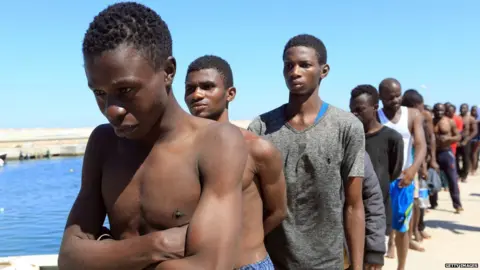 Getty Images
Getty ImagesNaomi Campbell and Giggs are among celebs sharing posts which say people are being sold as slaves in Libya.
It's after CNN released footage earlier this month in which sub-Saharan asylum seekers are seen being auctioned off as farm workers.
The United Nations says it is "stepping up its work" to stop the slave trade happening.
Thousands of people have signed a petition asking the UK government to take action too.
Warning: readers may find some of the photos in this article upsetting
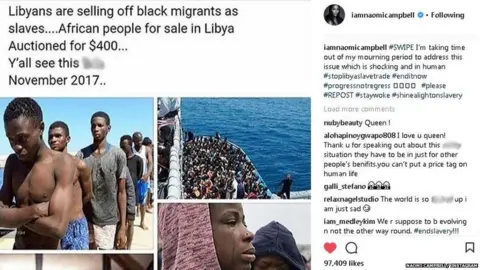 Naomi Campbell/ Instagram
Naomi Campbell/ InstagramLibya is an African country through which thousands of people from poor and war torn countries travel every year, in hope of finding a better life in Europe.
The CNN team travelled there after receiving footage that seems to show men being sold for $400 (£300).
They claim they discovered slave auctions taking place in at least nine different places.
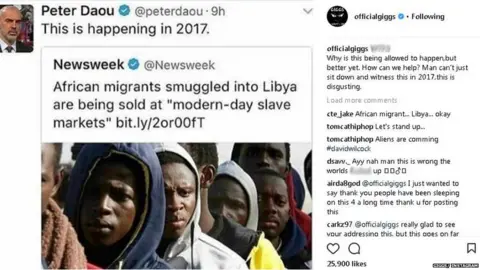 Giggs/ Instagram
Giggs/ InstagramUnited Nations chiefs held a special meeting in New York yesterday, and Libyan authorities say they've launched an investigation.
"This is an enormous human tragedy and we can stop it," said William Lacy Swing, director general of the International Organization for Migration (IOM).
Many of the photographs being shared on social media are from the CNN report, but others were taken from earlier in the migrant crisis.
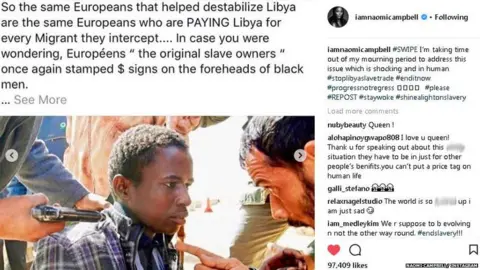 Naomi Campbell/ Instagram
Naomi Campbell/ InstagramFor example, one picture which shows men waiting in line was taken in Libya in July, and is not necessarily directly linked to the alleged slave trade.
And some others are years old.
One post about the slave trade claims which was shared by Naomi Campbell includes a photo taken in Libya in 2011.
It shows rebels threatening a man they accuse of being loyalist to then-leader Muammer Gaddafi.
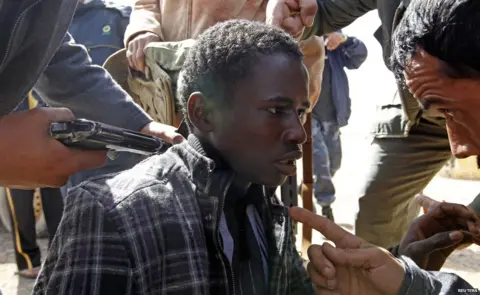 Reuters
ReutersMany of the migrants are sent back from Libya to their home countries with stories of rape, beatings and other brutal treatment.
Last week more than 150 migrants returned to the Ivory Coast, like 22-year-old Jerome, who was on his way to France.
"The people who act as human traffickers said they could take us to Europe. When we met with them, it was a false promise.
"They said they would take us to a place to rest, but when we arrived there, we realised we had been sold to a Libyan rebel chief," he told BBC World Service.
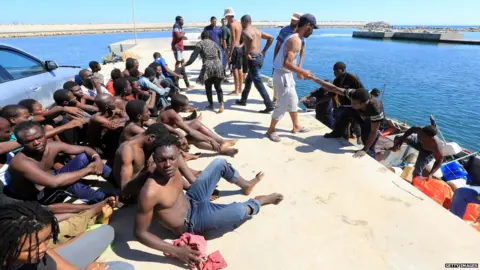 Getty Images
Getty Images"The rebel chief hit us, beat us, he didn't give us food. When we asked 'When are we leaving for Europe?', he said 'No, that's not happening'."
Jerome says he spent a month in prison, then he was sold again. His captors said they wouldn't let him go until his family transferred money to them.
More than 100,000 people have signed a petition asking the UK government to take action.
Clara Amfo, Stefflon Don and Giggs are among those supporting a march to the Libyan Embassy in London on 9 December.
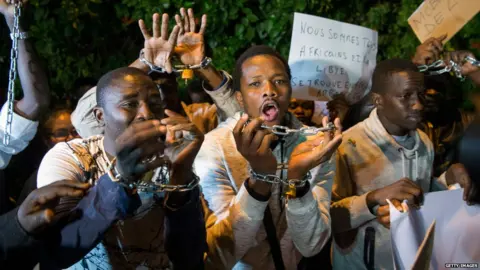 Getty Images
Getty Images"We know that there's human trafficking worldwide," says Leonard Doyle from the IOM.
"But the notion that 200 years after the abolition of slavery that people are being auctioned in public places is pretty shocking."
Compiled by Newsbeat and the UGC team.
Find us on Instagram at BBCNewsbeat and follow us on Snapchat, search for bbc_newsbeat
